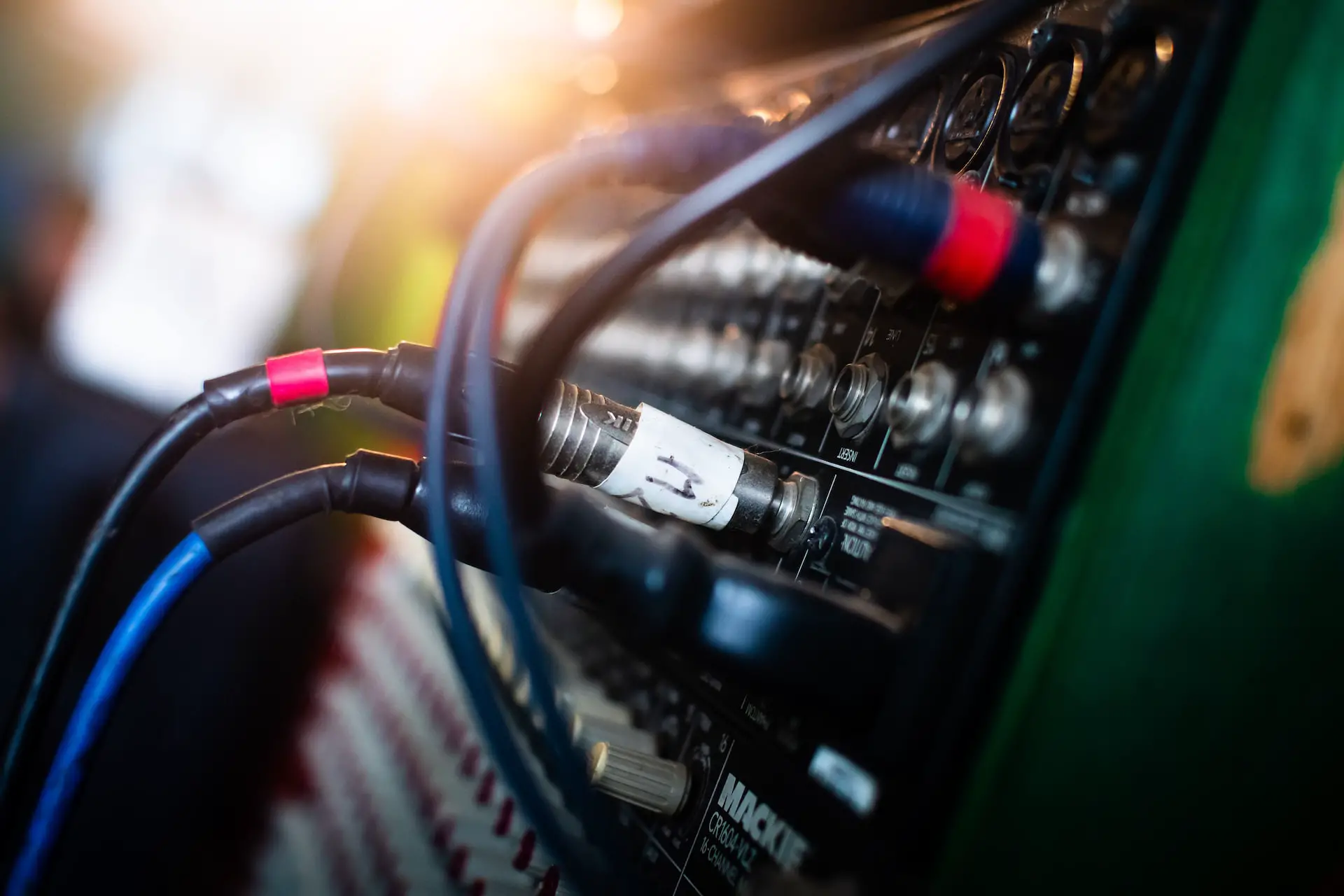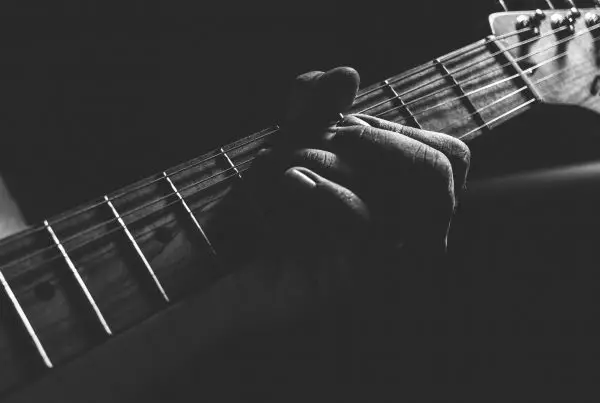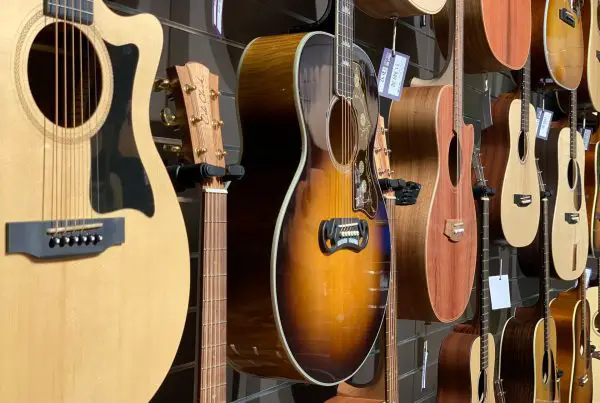A bad guitar cable can definitely cause a lot of buzzing sound effects. It makes this sound because electricity is not moving through the cord as well as it should, which creates a loud buzzing sound.
As someone who has played guitar and bass for over seven years, I can confirm that your guitar cord can go bad quickly if it is not properly looked after. I had spent a lot of money replacing these when I did not need to.
Bad guitar cables are the leading causes of interference and buzzing when playing the electric guitar and bass. The bad news is that all guitar cables do go bad eventually. It can be incredibly frustrating to start to play only to listen to many buzzing sounds interrupting your playing.
However, following a few simple steps will ensure you get the most extended shelf life out of your guitar cords that you possibly can (and save yourself some money, too) before replacing them.
It is never a pleasant experience to have your guitar cable go bad. However, the good news is that there are options to expand the shelf-life of your cable.
In this article, we will go over other reasons why a bad cable will cause amplifier buzzing, how to stop them from buzzing, other reasons why guitar cables can go bad, how to know if your guitar cable has gone bad, tips to prevent them from going bad, and a recommended cable.
Also Read: Complete Guide To Stop EVERY Type Of Buzzing Noises For Amp!
Why Does Bad Cable Cause Amp Buzz
The guitar amplifier’s bad chord can buzz due to poor electric supply. Cables go through wear and tear, so it is natural that they will not carry the electricity properly after a while, which will cause that sound.
The sound it produces is loud and long-sustaining. A bad cable will make this noise as the cable is moved.
Also Read: Effect Of Guitar Cables On Tone: Length, Thickness, Costs
6 Reasons Why Guitar Cable Can Go Bad
1. Wear and tear
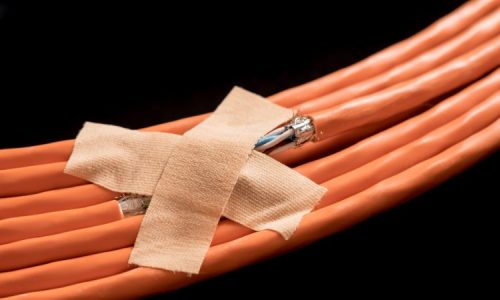
Guitar cable wear and tear
All guitar cables eventually go bad. This is caused by regular wear and tear from simply using it.
To get the most shelf-life from your cable, handle these cables carefully and treat them like fragile pieces of equipment. The more care you handle them with, the longer and better they will work for you.
2. Stepping on it
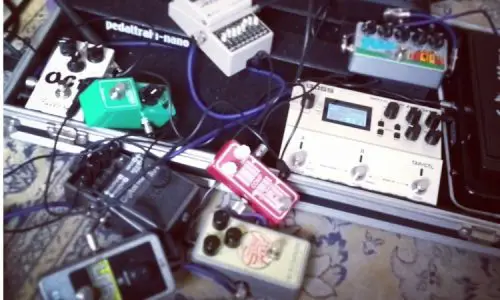
Messy guitar cable
As you move around playing your guitar on a stage or wherever you are playing with yourself or a group of people, it can be difficult not to step on your cable. However, since the cable is not designed to handle your weight, it should be placed outside of areas where you or other people you are playing with so it is not in the way.
3. Improper Unplugging
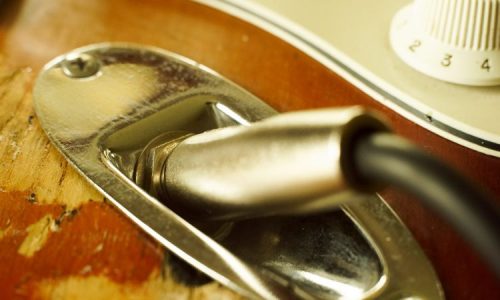
Guitar cable plug
Your cable is designed to be plugged into the amplifier and unplugged from the amplifier at the jack. Pulling the cable out by grabbing it and pulling on it can prematurely damage the cable. Pulling it out at the jack, where it plugs into the amplifier and the guitar, will ensure you will get more life out of the cable.
4. Bad Solder (two wires in the jack came undone)
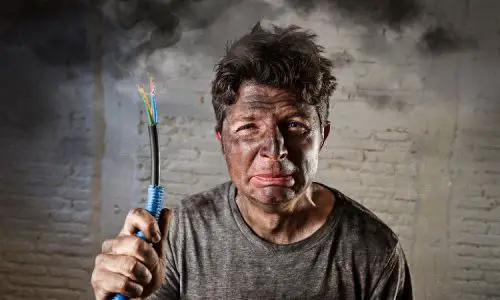
The jack of your cable (the metal male part plugs into the outlet) carries two wires. If the wires are not soldered into the jack properly, come loose, undone, etc., this can ruin your guitar cable.
5. Bad rubber (rubber outside the cord)
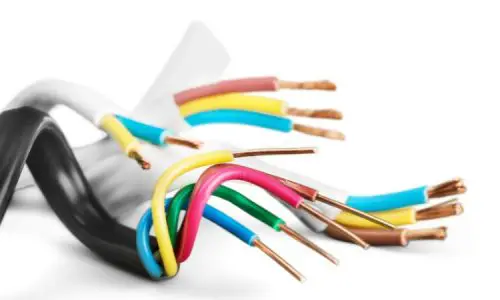
Most cables are composed of rubber covering the cable’s internal wiring. If the rubber goes bad, it does not correctly protect the wiring inside of the cables. This is why cables wrapped in cloth can be more expensive, as it offers more protection.
6. Bad oxidation
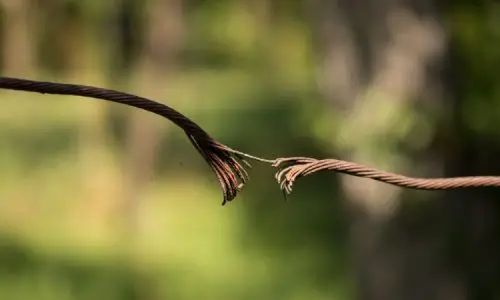
Rust and other types of oxidations can accumulate on the ends of the guitar cables that you play with. This oxidation can interfere with the electrical signal from your guitar to your amplifier.
Sandpaper can sometimes remove rust and oxidation from the guitar cables. While this only sometimes works (depending on how much oxidation is on the end of the cable), it is a good idea to have some sandpaper on hand.
How To Know If Your Guitar Cable Has Gone Bad
If your guitar cable goes bad, you will hear a buzzing, crackling sound. You will also hear a distorted crackling sound when attempting to move the cable or moving around while you are playing.
You can check the problem by turning on the amplifier with no cables, and nothing plugged in. It is most likely your cable if you only hear the distorted sound when plugged in. You can also test this by playing with a new cable.
Other things to check on your cable are if they look frayed at all or if any of the metal parts are loose. If you see any rust or oxidation on the end of the jack, this can also cause your cable to go bad. This can sometimes be corrected by gently taking sandpaper to the affected area on the cable’s jack.
7 Ways To Stop Guitar Cable From Buzzing
1. Solder it
Inside the jack that your cable connects to and plugs into the female input of your amplifier, there are two wires, negative and positive. You can remove this metal cover from the cable to properly solder the wires back into their proper position.
2. Get the right cable length
Your guitar cord should be just long enough to connect your playing to the amplifier. There is no legitimate need to have the cord longer than that.
The longer your cable is, the more the electronic signal travels through the wire to reach the amplifier. A longer cable will have more electrical wiring to travel through. The more wiring there is, the more wiring there is to become damaged.
The electrical streams from different cables should be kept as far away as possible from other cables. They should not be running parallel and stored as close to a right angle from each other as possible.
3. Think of cable routing
Anything that has an electrical current passing through it will create an electrical field surrounding it, including your cable. Suppose most of the unused portion of the cable is coiled up next to a large amplifier. In that case, the electrical field from the amplifier could negatively influence the electrical signal that travels from your guitar.
To fix this problem, remove the unused section of the cable and string it from the guitar to the amplifier. Suppose your buzzing comes from electrical interference from other electrical equipment you are using. In that case, it should stop occurring once the unused portion of the cable is no longer next to the amplifier.
4. Keep it in good shape
Your guitar cable is designed to be flexible and to bend. However, if it is bent too much and too often, it will wear out faster than it would usually. Throwing a cable into your guitar case or elsewhere without coiling it up properly will wear it down faster than if it is properly wrapped up when it is no longer being used.
5. Surge Protector
Your guitar cable carries an electrical current through it (which carries the vibration from your strings). Like any electrical equipment, it is vulnerable to electrical spikes from the electrical outlet where you plug in your amplifier.
Electrical components are better protected when connected to a surge protector. The surge protector will significantly safeguard your guitar cable, the amplifier, and the other electrical components you play with.
6. Consider a higher-quality cable
All cables will eventually wear down and no longer function properly. The higher the quality of the cable, the more shelf life you will get from it. Cables are the most vulnerable spots for noise interference.
The higher the quality of the cables, the less chance of interference from the cable. Consider upgrading to a higher-quality cable (and surge protector) if you can at all afford to do so.
7. Replace It
Realistically speaking, replacing the cable will be much easier and more cost-effective. I suggest upgrading with the most expensive and high-quality cable you can afford.
The last thing you will want to deal with when you are playing out is to have a cable go bad on you when you are playing out for a gig. Consider having an extra cable with you just in case you need it. It is better to not need a cable and have one than to need a cable and not have one.
7 Tips To Protect Your Guitar Cables From Going Bad
1. Replace regularly
Your cables will ultimately go bad. Your cables have electrical wiring and components in them that are designed to be twisted and bent. However, like most products, they can only last for a while.
These options listed in this article will not stop the cables from going bad but will help to keep them functioning for as long as possible. Since cables always go bad at the worst possible times, I recommend protecting your cables to get the most life out of them.
2. Unplug The Cord Properly
Grabbing the cord from its halfway point (or from any point not at the jack) and pulling it out from the guitar (or the amplifier, guitar pedal, etc.) will wear it down quickly.
You will grab less of the cable when you pull the cord out from the jack. The less the electrical components inside the cable are grabbed and handled by your hands, the longer they will last.
4. Watch where the cable is located
Your guitar cable is vulnerable to electrical interference from other electrical components. If most of the cable is wrapped up or coiled next to any large piece of electrical equipment, it will absorb more of the electrical field from the larger piece of equipment it is next to. The more of an electrical area the cable is subjected to, the less shelf life it will have.
5. Wrap it when done
Cables have sensitive and fragile electrical components inside of them. When the cable is thrown into a guitar case (or elsewhere) while it is not wrapped, it is subject to becoming damaged more easily.
6. Don’t Step On It
Stepping on a cable will damage the cable’s internal wiring, as the cable is not designed to handle the weight of a person standing on it. The less damage done by people standing on the cable, the longer it will last.
7. Have a backup cable
All cables will eventually go bad, no matter how well you care for them. Having a backup cable available is always a good idea. Better to have one and not need it than to need one and not have it.
My Recommended Guitar Cable
I suggest the Gigsnake cable (they are available in an option for a 10-foot cable, a 15-foot cable, and a 20-foot cable).
The cable itself has a cloth covering, which will last longer and protect the internal wiring inside the cable better than a rubber covering found on most electrical cables.
It is more expensive than a lot of cables. However, I still suggest considering this one based on its rating. You will also get a much longer shelf-life from a higher-quality guitar cable than a lower-quality guitar cable.
Conclusion
In conclusion, we went over other reasons as to why a bad cable will cause amplifier buzzing, how to stop them from buzzing, other reasons why guitar cables can go bad, how to know if your guitar cable has gone bad, tips to prevent guitar cables from going bad, and provided a recommended cable.
Please remember that all cables eventually go bad, so you should not become disappointed or upset when your cable goes bad. It is a good idea to carry a spare cable with you for backup when you are playing (and an extra set of strings as well).
The last thing you will want when you are playing a gig is to suddenly have something like a cable go out on you. Following the information in this article will help ensure you get the most playing life out of your guitar cable possible.


